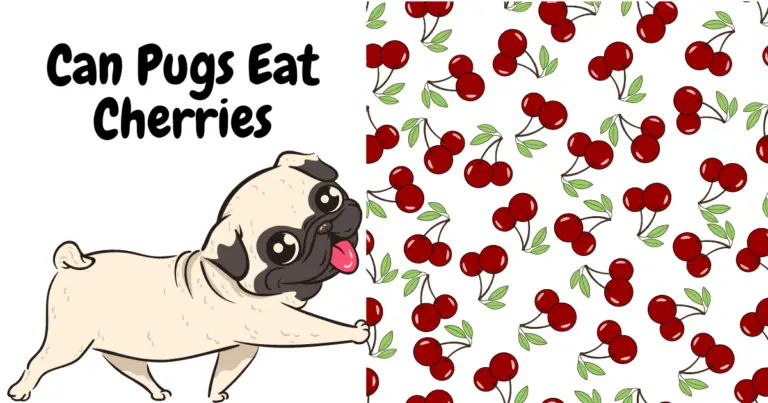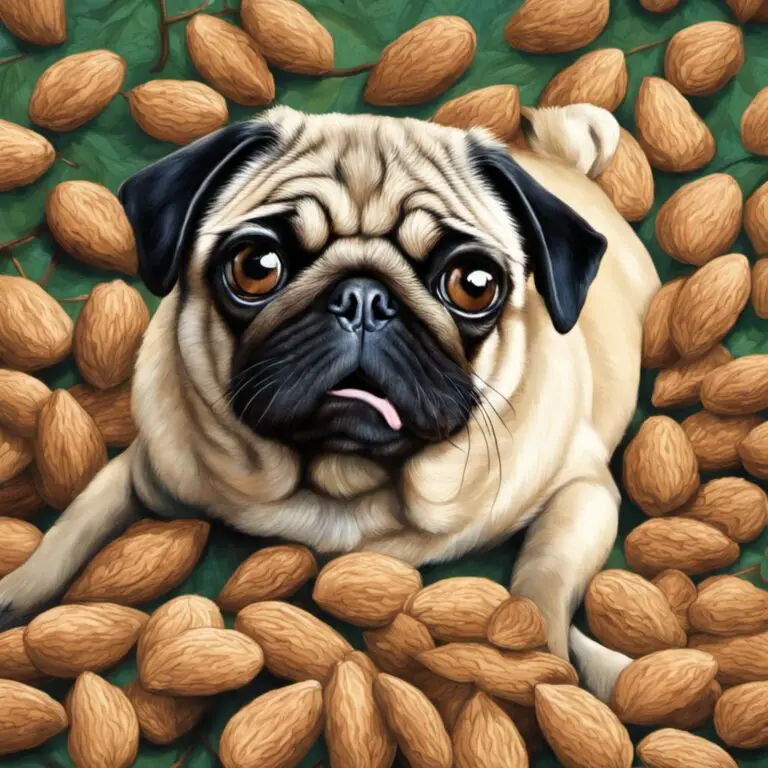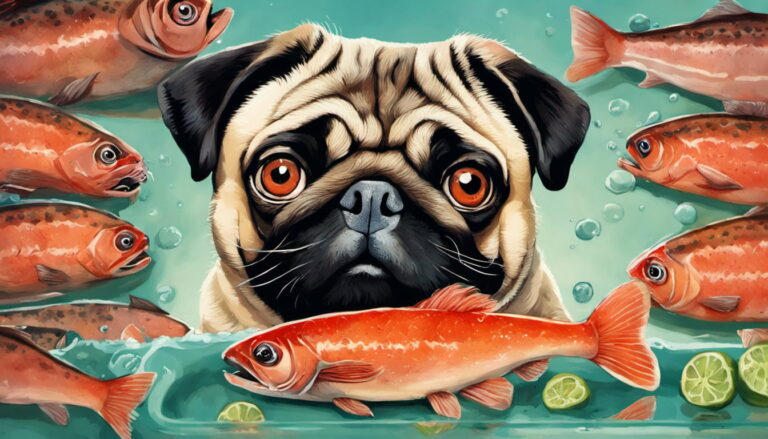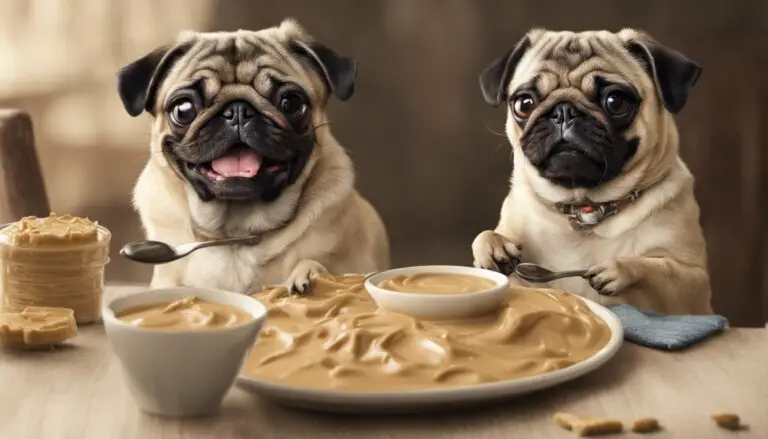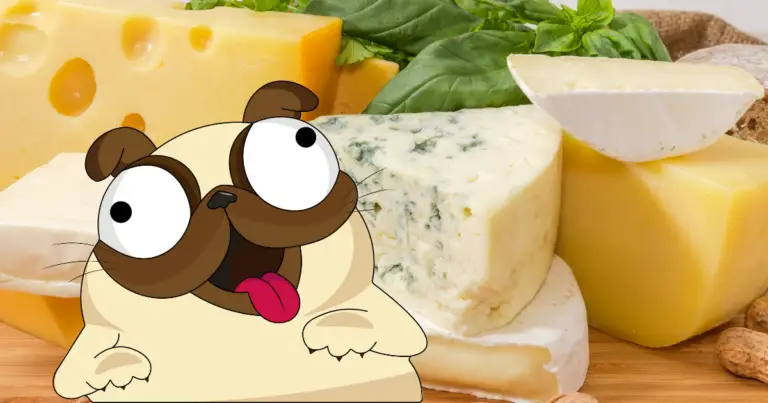Can Pugs Eat Coconut? A Comprehensive Guide for Owners
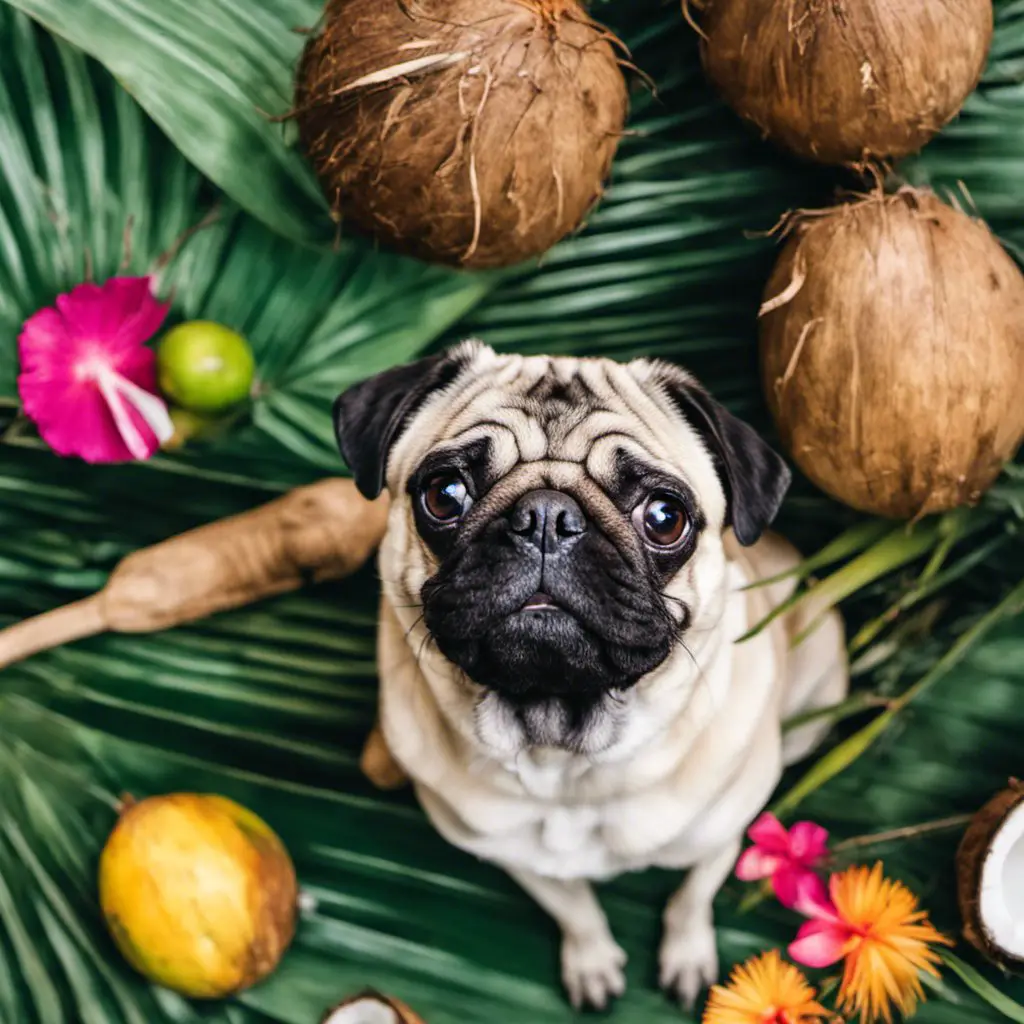
Coconut has become a popular ingredient in the world of pet nutrition, and many dog owners wonder if their furry friends can enjoy this tropical treat as well. When it comes to pugs, one might question whether their small size and unique dietary needs make coconut an appropriate snack for them. Can Pugs Eat Coconut?
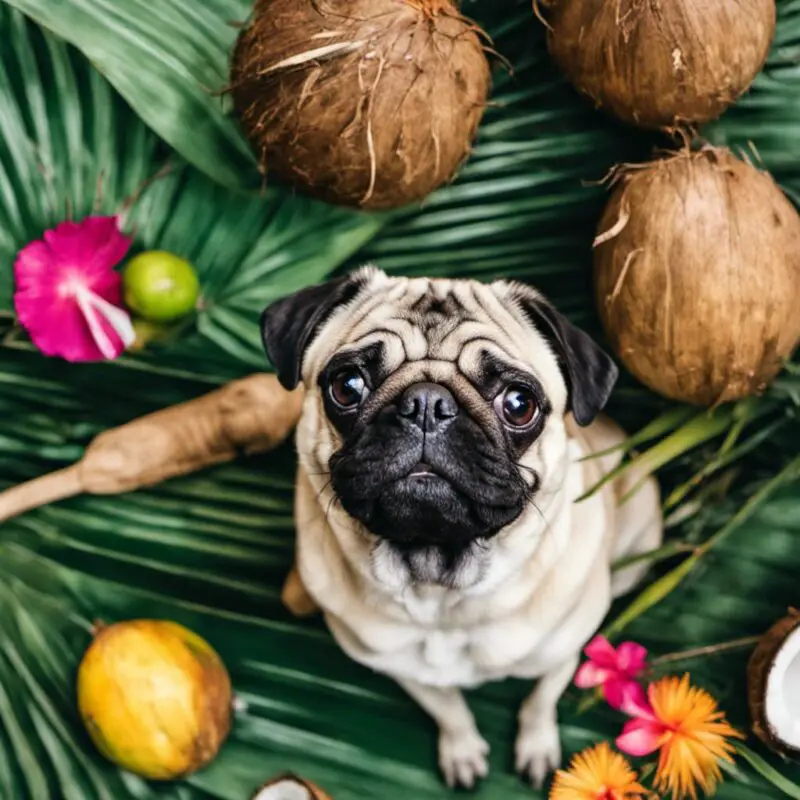
The good news is that pugs, like other dogs, can safely consume coconut in moderation. Coconut is non-toxic and offers several health benefits for dogs, such as improving their skin and coat, aiding in digestion, and supporting their immune system. However, it is important to remember that every dog is different, and it is essential to monitor your pug’s reaction to coconut before making it a regular part of their diet.
Introducing coconut to your pug’s diet should be done carefully, as too much of a new food can cause digestive issues or allergies. Start with small amounts of coconut oil, meat, or milk, and always consult your veterinarian for guidance on proper portion sizes and feeding frequency.
Remember that balance is key, and moderation will help ensure that your pug enjoys the benefits of coconut without any adverse effects.
Contents
Get The Free Food Eating Guide That Keeps My Pug Happy and Playful Even at 13 Years Old
100% Beginner Friendly & Lists Real Foods Your Pug Can Actually Eat!
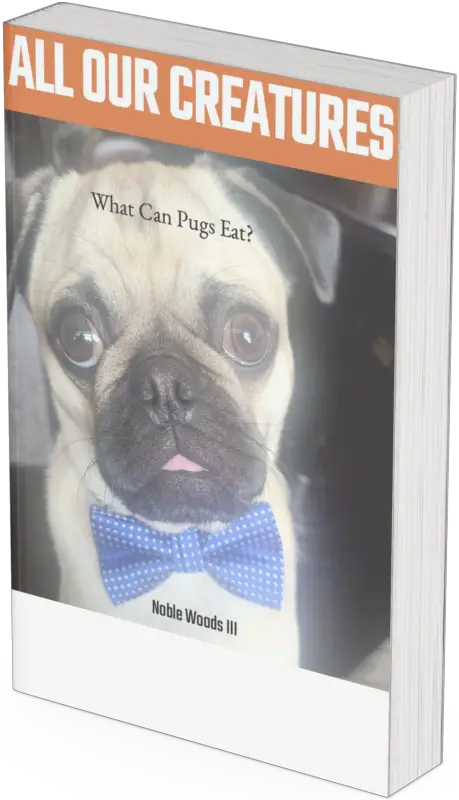
Table of Contents
The Pug’s Dietary Needs
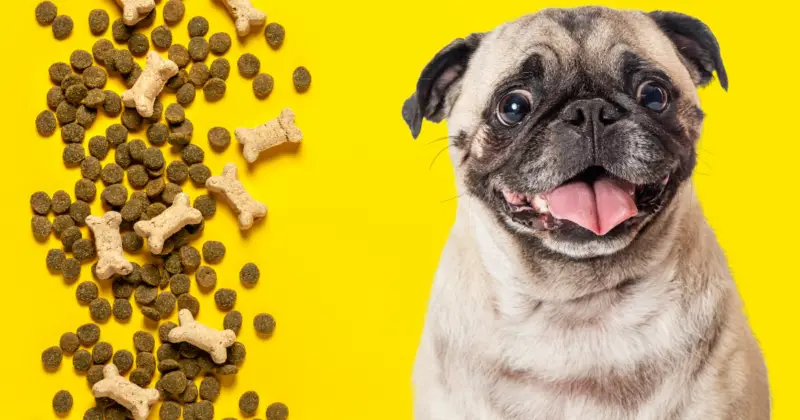
Pugs, like all dogs, have specific dietary needs to maintain their health and well-being. Providing them with a balanced and nutritious diet that meets their unique requirements is essential.
High-quality dog food, recommended by a veterinarian, should form the basis of their diet. This food will contain the necessary nutrients and appropriate ingredients to support their growth, development, and overall health.
When it comes to their diet, pugs require a balance of protein, carbohydrates, fats, vitamins, and minerals. Lean proteins such as chicken, turkey, or fish are vital for muscle development and maintaining a healthy body weight. Carbohydrates are essential for supplying energy, while healthy fats, like those found in fish oil or flaxseed, support skin and coat health.
In addition to conventional dog food, pugs may benefit from the inclusion of certain fruits and vegetables in their diet. These can provide essential vitamins, minerals, and antioxidants to support their immune system and overall health. However, it is crucial to consult your veterinarian before introducing new foods to ensure they are suitable and safe for your pug.
Proper portion control is also a vital aspect of the pug’s diet. Overfeeding can lead to weight gain and obesity, which puts additional strain on their joints and can contribute to various health issues. Therefore, it is crucial to monitor your pug’s weight and adhere to the feeding guidelines provided by the dog food manufacturer or your veterinarian’s recommendations.
Lastly, hydration is of utmost importance for pugs, just as it is for all dogs. Ensure that your pug always has access to fresh, clean water to maintain proper hydration levels and support their overall health.
In summary, providing your pug with a balanced diet that includes high-quality dog food and consultation with a veterinarian will help them maintain a healthy and happy life.
Overview of Coconut as a Food Item
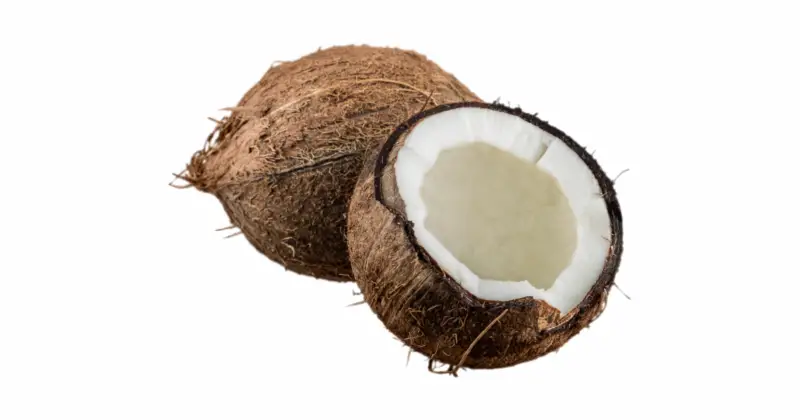
Coconut is a versatile and widely enjoyed fruit that comes from the coconut palm tree. It is commonly consumed in various forms, including coconut meat, coconut oil, and coconut water. Coconuts are valued for their delicious taste and impressive nutritional content, offering an abundance of vitamins, minerals, and antioxidants.
The calories in coconuts primarily come from their fat content, which is comprised of both saturated and unsaturated fats. While high in calories, the fats found in coconuts can provide certain health benefits. For example, lauric acid, a saturated fat found in coconuts, has been shown to exhibit antimicrobial properties and support the immune system.
In addition to fats, coconuts are packed with essential nutrients like manganese, potassium, and antioxidants. Manganese is important for bone health, metabolism, and antioxidant function. Potassium plays a crucial role in regulating blood pressure, balancing fluids in the body, and supporting proper muscle function.
Coconut meat is the white, edible flesh found inside the coconut shell. It can be consumed raw, dried, or in various culinary dishes. Coconut meat offers a good amount of fiber, healthy fats, and numerous vitamins and minerals.
Coconut oil is extracted from the meat and contains a high amount of medium-chain triglycerides, which have been linked to various health benefits, including improved brain function, weight management, and a lower risk of heart disease. It is widely used in cooking, skincare, and as a dietary supplement.
Coconut water is the clear liquid found inside young coconuts. It is known for its hydrating properties and naturally occurring electrolytes which can aid in maintaining proper hydration and replenishing lost nutrients during exercise.
In conclusion, coconut is a nutrient-dense fruit that offers a wide range of health benefits when consumed in moderation. Whether enjoyed as coconut meat, oil, or water, it can be a valuable addition to a balanced diet. However, it is important to consider the high-calorie content of coconuts and consume them in moderation, particularly for those watching their weight or with specific dietary restrictions.
Can Pugs Eat Coconut?
Potential Benefits of Coconut for Pugs
Coconut can be a healthy addition to a dog’s diet, providing numerous benefits, especially for pugs. One of the significant advantages of coconut is its rich medium-chain fatty acids content, which serves as a healthy fat and energy source for your pug.
In addition to being a healthy fat, coconut can help improve your pug’s skin and coat condition. The anti-inflammatory properties found in coconut can alleviate itching and irritation, while its natural moisturizing effect can help maintain a healthy, shiny coat.
Moreover, coconut can also contribute to a robust immune system for your pug thanks to its antiviral, antifungal, and antibacterial properties, which can protect your dog from various infections and illnesses.
Since pugs can sometimes experience skin issues and are prone to allergies, incorporating coconut into their diet may help alleviate these common problems. However, it is essential to remember that moderation is vital, as excessive consumption of any treat, including coconut, can lead to weight gain or other health issues.
Therefore, introducing coconut into your pug’s diet methodically and in small quantities can provide a wide range of benefits for their overall health, enhancing their skin, coat, and immune system, making it a valuable addition to their regular diet.
Possible Risks and Side Effects of Coconut
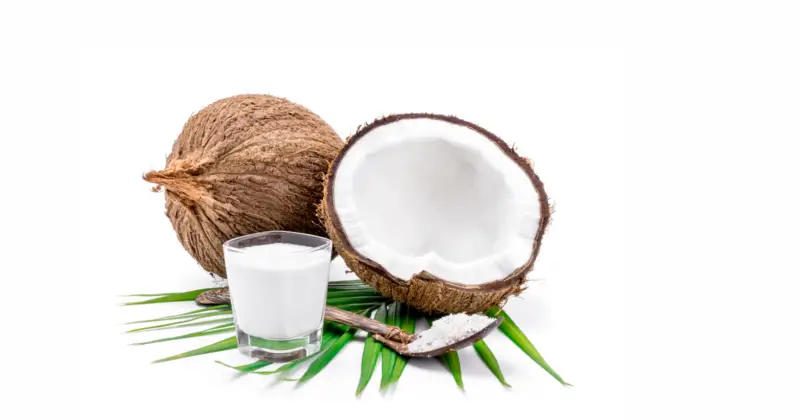
While coconut can be a safe treat for dogs, there are some possible risks and side effects to consider when giving it to your pug. Firstly, coconut contains a high amount of fat, and excessive consumption may lead to weight gain and potentially pancreatitis, a painful and potentially life-threatening condition.
Ingesting large quantities of coconut can also cause gastrointestinal issues, such as diarrhea or constipation. To prevent this, always initially provide your pug with a small amount of coconut, and gradually increase the amount if they don’t experience any side effects.
The coconut shell poses a choking hazard and can result in intestinal blockage if ingested. Ensure that you remove the shell before giving coconut to your pug. Also, avoid giving coconut products with added sugars, as they can be harmful to your pet.
Though coconut is not toxic or poisonous, some dogs may have an allergic reaction to it. Symptoms of an allergic reaction might include vomiting, itching, and swelling. If you suspect your pug is having an allergic reaction, contact your veterinarian immediately.
In conclusion, while coconut can be a safe treat for pugs, it is essential to be aware of the potential risks and side effects. Always monitor your pet’s reactions to new foods, and consult your veterinarian if you have any concerns about your dog’s diet.
Treats and Snacks for Pugs
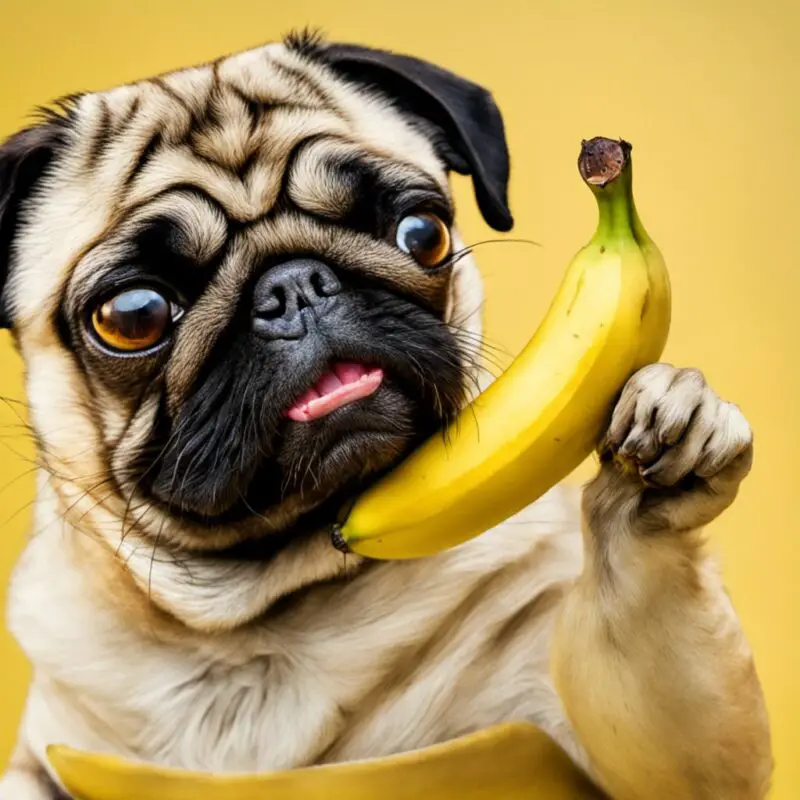
Offering your pug a variety of treats and snacks can greatly benefit their health and happiness. While some dog treats are specifically designed for canines, many healthy human foods can also be suitable for your pug.
Fruits such as pears, blueberries, bananas, and apple slices (without seeds) make excellent snacks. These fruits are tasty and rich in vitamins, antioxidants, and fiber. In moderation, strawberries are another nutritious fruit to consider, as they are packed with essential nutrients. However, oranges should be avoided as their acidity can cause digestive problems in pugs.
Watermelon and cucumber slices are perfect for a refreshing treat, especially during hot summer days. Be sure to remove the seeds from the watermelon to prevent choking hazards. If you’re looking for an extra boost of fiber and nutrients, raspberries are an excellent choice, and they can even be frozen for a longer-lasting treat.
Carrots provide a crunchy option that can help improve your pug’s dental health and supply them with essential minerals and vitamins. Other vegetable-based treats to consider include cucumber slices and diced bell peppers, which offer a mix of crunch and hydration.
Peanut butter is popular for pugs as it’s rich in protein and healthy fats. Opt for an all-natural, unsalted, and sugar-free version to ensure your pet doesn’t consume any harmful additives. When it comes to coconut, pugs can indeed enjoy the benefits of coconut oil in moderate amounts. Added to their diet, coconut oil can help with digestion, skin health, and overall well-being.
Remember always to introduce new foods to your pug gradually and in small quantities. Monitor their reaction to the treatment and consult your veterinarian if you have any concerns or notice any adverse reactions.
Toxic Foods for Pugs

Pugs, like all dogs, have a unique digestive system, and there are certain foods that can be harmful or even toxic to them. Among these toxic foods are chocolate, xylitol, grapes, onions, avocado, and some fruits like cherries and cranberries. It is crucial for Pug owners to be aware of the potential dangers these foods pose and to keep them away from their beloved pets.
Chocolate is one of the most poisonous foods for Pugs due to the toxic theobromine substance it contains. Even small amounts of chocolate can cause serious health problems; in severe cases, it can be fatal to dogs.
Another toxic substance to watch out for is xylitol, a sugar substitute commonly found in sugar-free gum, candy, and sweets. Xylitol can cause rapid insulin release, leading to hypoglycemia and severe health complications in Pugs. Always check the ingredients of food items and avoid those containing xylitol.
Fruits like grapes and raisins should also be avoided, as they can cause kidney failure in dogs. Similarly, onions, garlic, leeks, and chives contain compounds that can damage red blood cells and lead to anemia in Pugs. It’s important to keep these foods and any dishes containing them out of your Pug’s reach.
Avocado contains a substance called persin, which can be toxic to dogs if consumed in large quantities. While small amounts of avocado flesh may not be harmful, it’s best to avoid giving it to Pugs to prevent any potential issues.
Some fruits, like apples and cantaloupe, are safe for Pugs when served in moderation and without seeds. However, cherries and cranberries should be avoided, as they can cause gastrointestinal upset and even toxicity in some cases.
Lastly, macadamia nuts can cause weakness, vomiting, and tremors in dogs, so they should be avoided as well.
In conclusion, it is essential for Pug owners to be aware of and avoid feeding their pets any foods that can be toxic or harmful to their health. Stick to a well-balanced dog food diet, and always check with your veterinarian before introducing new foods to your Pug’s diet.
Coconut Recipes for Pugs
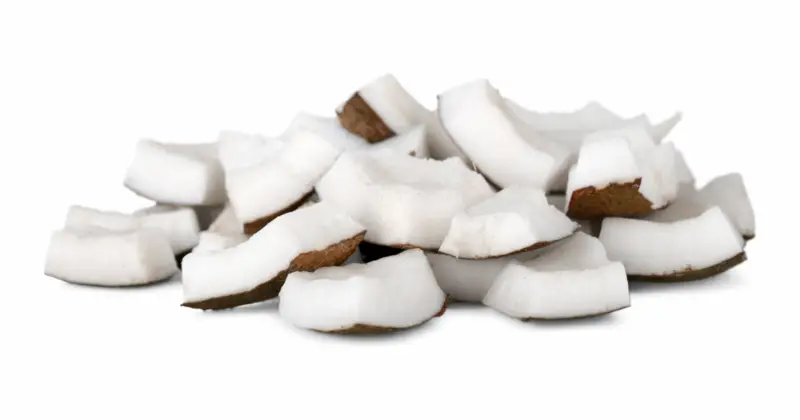
Coconut can be a healthy addition to your pug’s diet, offering several benefits. Here are some coconut-based recipes to include in your pug’s meals:
- Coconut-Pumpkin Pug Treats: Combine 1/2 cup of pureed pumpkin, 1/4 cup of coconut oil (melted), 1/4 cup of coconut flour, and 1 beaten egg. Mix well and form small balls, then bake them at 350°F for 15-20 minutes. These treats are not only healthy, but your pug will love the taste of pumpkin and coconut together.
- Coconut-Veggie Blend: Mix 1/2 cup of finely chopped vegetables, like carrots and green beans, with 1 1/2 cups of cooked brown rice, 1 tablespoon of melted coconut oil, and a pinch of turmeric. Stir well and serve to your pug as a side dish alongside their regular meals. This recipe incorporates coconut oil and vegetables for added nutrients.
- Egg and Coconut Scramble: Lightly whisk 2 eggs with 1 tablespoon of melted coconut oil. Pour the mixture into a non-stick skillet, and cook the eggs gently over low heat. Break the cooked eggs into small pieces suitable for your pug to eat. This recipe provides a smooth blend of protein and healthy fats with a hint of coconut flavor.
- Coconut Meat and Chicken: If you can access fresh coconut meat, you can make a simple meal for your pug by blending 1/4 cup of shredded coconut meat, 1/4 cup of cooked and deboned chicken, and 1/4 cup of cooked broccoli. Combine all ingredients and serve. This meal offers a tasty mix of meat, vegetables, and coconut for a well-balanced treat.
These simple coconut recipes can add variety to your pug’s diet while providing the benefits of coconut oil. Remember to introduce any new foods gradually and observe your pug’s reaction to ensure they enjoy and digest these coconut treats well.
Consulting with a Vet: When and Why
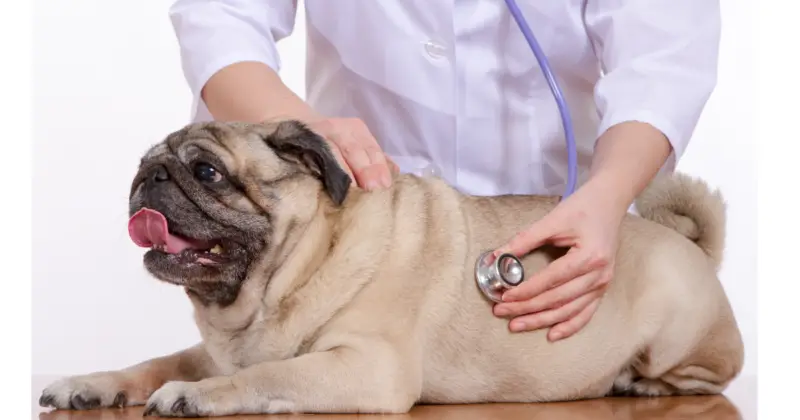
Consulting with a veterinarian is essential for pug owners when it comes to feeding their pets coconut. Although coconuts are generally considered safe for dogs, each dog is different, and it’s crucial to ensure that introducing this tropical fruit into your pug’s diet won’t cause any adverse reactions.
Consulting for Guidelines: A vet can provide guidelines on the appropriate amount and form of coconut that is safe for your pug to consume. Since coconut meat is high in fat and calories, it should be given to pugs in moderation. Remember that treats, including coconut, should make up no more than 10% of a dog’s daily caloric intake.
Allergies and Sensitivity: Some dogs may be allergic or sensitive to certain foods like humans. A veterinarian can help identify if your pug has any known allergic reactions to coconut. If your pug has never had coconut before, it’s a good idea to discuss this with your vet first.
Introducing Coconut Gradually: When introducing new foods to your pug’s diet, it’s important to do it gradually. A vet can suggest the best approach to take when incorporating coconut into your pug’s meals, ensuring a smooth transition and minimizing the risk of upset stomachs or gastrointestinal issues.
In summary, consulting with a veterinarian is crucial for pug owners considering adding coconut to their dog’s diet. Doing so helps ensure that it will be a safe and enjoyable treat for their beloved pet.
FAQs: Can Pugs Eat Coconut

Can pugs consume coconut oil safely?
Yes, pugs can consume coconut oil in moderation. Coconut oil can provide benefits like promoting a shiny, healthy coat. However, remember it is high in fat and should be given in small amounts to avoid excessive weight gain.
Is dried coconut appropriate for pugs to eat?
Dried coconut can be fed to pugs in small amounts, as it is non-toxic. However, due to its high-fat content and potential to cause intestinal blockages, make sure to monitor your pug’s consumption and only offer it as an occasional treat.
Coconut cookies made specifically for dogs can be a suitable treat, but always check the ingredients for any potential allergens or harmful substances. Avoid giving pugs human-grade coconut cookies, as these may contain ingredients that are unsafe for dogs, such as chocolate or excessive amounts of sugar.
Do pugs benefit from drinking coconut water?
While coconut water is not toxic to pugs, it is not particularly beneficial. Pugs gain most of their necessary hydration from fresh water, so coconut water is not essential and may provide unnecessary calories. Additionally, coconut water can sometimes cause diarrhea or upset stomachs in sensitive dogs.
Can coconut cause diarrhea in dogs?
Yes, coconut in large quantities or introducing it too quickly into a dog’s diet can cause diarrhea. Coconut contains natural oils and fats that can lead to digestive upset if a dog is not accustomed to it. Always introduce new foods gradually and monitor your pug for any signs of distress or intolerance.
Is coconut cream safe for canines?
Coconut cream is not recommended for canines, mainly due to its high-fat content and the possibility of causing obesity or pancreatitis. Additionally, coconut cream products often contain added sugars, which can also be harmful to your pet.

